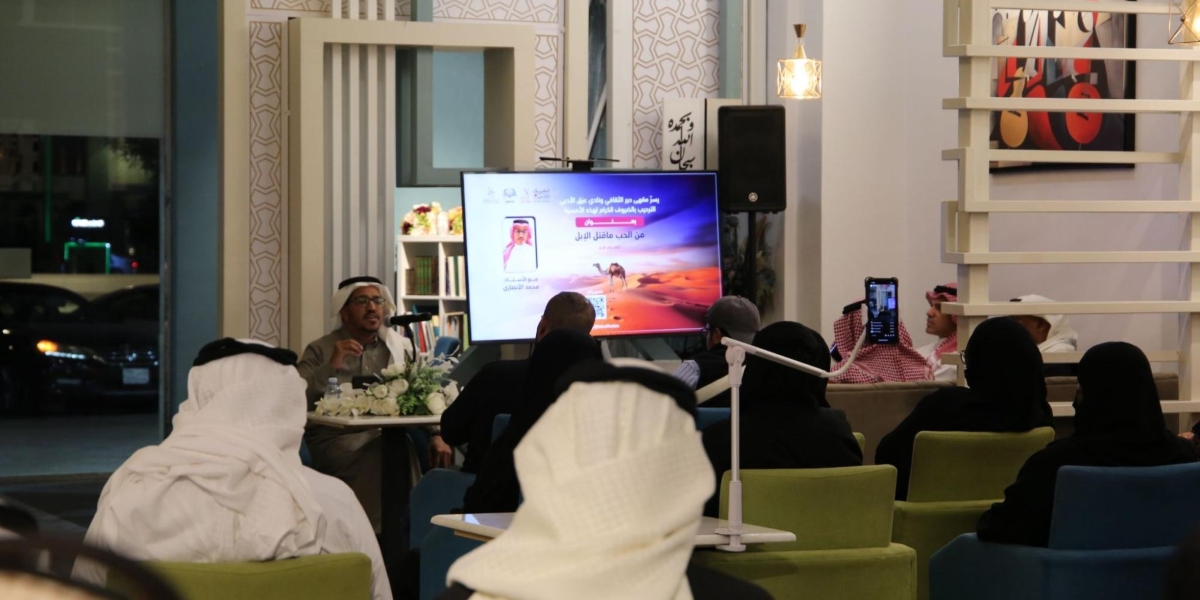By: Andrzej Kozioł
In Saudi Arabia, a nation undergoing a significant cultural and economic transformation, an unlikely partnership is blossoming, not between tech giants and oil conglomerates but between the government and local coffee shops. This is not a story of billion-dollar deals, but of a grassroots movement aimed at contributing to the reimagining of the country’s literary scene, one cafe at a time.
The Literary Partner Initiative (LPI), a brainchild of the Literature, Publishing and Translation Commission (LPTC), quietly works to transform ordinary cafes into vibrant cultural hubs, sparking a love for literature and providing a platform for emerging Saudi voices. Whether this unique approach can significantly influence a nation’s cultural identity or remains a trend in a rapidly changing society remains to be seen.
Literature for the People, One Cafe at a Time
The Literary Partner Initiative is, at its core, about accessibility. It is about taking literature out of the hallowed halls of academia and placing it in the heart of everyday life. The LPTC’s decision to partner with local cafes was a deliberate move to reach a wider audience, particularly young Saudis who may not have traditionally engaged with literary culture.
The initiative provides these cafes with resources, training, and support to host a variety of literary events, from poetry readings and storytelling sessions to book clubs and author meet-and-greets. As of 2024, 80 cafes across all 13 regions of Saudi Arabia have joined the LPI, each hosting monthly literary activities and transforming into notable cultural destinations within their communities. It’s not a top-down cultural dictate but a collaborative effort to cultivate local engagement.
Stories in the Streets: A Community-Driven Literary Revival
The guiding force behind the Literary Partner Initiative is General Administrator of the Literature Sector at LPTC, Khalid Al Sameti, a recognized figure in Saudi Arabia’s cultural scene. With an MBA from King Saud University and a professional background in digital transformation, Al Sameti brings a combination of business expertise and cultural sensibility to his role within the Literary Partner Transformation Council (LPTC). Positioned at the intersection of strategic leadership and grassroots engagement, he has become a key architect in one of the kingdom’s more unconventional cultural experiments.
Known for his work in driving institutional strategy and digital modernization, Al Sameti is now channeling his skills toward a different kind of transformation: one that seeks to cultivate a national love for literature and amplify local voices. His path to this role mirrors the initiative itself—methodical, forward-looking, and deeply rooted in community impact.
“We needed to find innovative ways to connect with young Saudis,” Al Sameti says. “We realized that cafes were already natural gathering places. By transforming them into literary hubs, we are creating a cultural ecosystem that is both accessible and engaging.”
That insight—bridging digital thinking with human connection—has been pivotal to the LPI’s growth. Al Sameti’s leadership is marked by a data-informed approach, tracking participation metrics and outcomes to refine programming. Just as importantly, he champions local collaboration, partnering with cafe owners and community leaders to ensure the initiative responds to real needs on the ground.
Fundamental to his mission is a clear goal: to celebrate and elevate Saudi culture, not through mandates, but through meaningful encounters with literature in everyday life.
Books Beyond Borders: The LPI’s Grassroots Model for the World
The Literary Partner Initiative’s mission is deeply intertwined with Saudi Arabia’s Vision 2030, a comprehensive plan for economic diversification and social transformation. The initiative’s short-term goals focus on raising global awareness, spotlighting the involvement of Saudi cafes, and generating international media coverage.
The goals also include spotlighting the involvement of Saudi cafes (the Literary Partners) in promoting literature and reading culture. In the medium term, the LPI aims to establish itself as a model for community-based literary engagement in the Arab world, while developing strong media relationships with international cultural and literary outlets. The plan for Khalid and his team is to demonstrate their innovative spirit by solidifying Saudi Arabia’s presence in literature.
With 2030 on the horizon, the LPI aspires to become a globally recognized program that promotes literature through grassroots efforts, encourages nominations for international cultural awards, and inspires similar initiatives worldwide. This includes forming a cultural bridge for all Arabic readers.
The Literary Experiment That’s Changing the Conversation
The Literary Partner Initiative, while still in its early stages, represents a bold experiment in cultural transformation. By reimagining the role of cafes as literary hubs, the LPI is not only inspiring a love for reading and writing but also encouraging a reconsideration of traditional notions of what constitutes culture.
As the initiative continues to evolve—now in its fourth edition and reaching its conclusion with a cultural ceremony on May 30, 2025, at the King Fahad Cultural Center in Riyadh—it offers a compelling case study for other countries seeking to promote cultural exchange, empower local communities, and build a more inclusive society.
“Literature is a universal language,” says Khalid Al Sameti, “and by creating spaces where people can connect with it, we are building bridges between cultures and fostering a greater understanding of the human experience.” Whether it can sustain its momentum is an open question, but it signals something noteworthy about a kingdom willing to embrace change in unexpected ways.


















